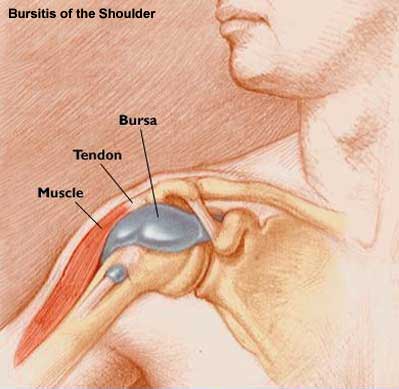Does it hurt to move your arm? Is it tender and radiating pain to your neck and finger tips? Do you have a fever? If you answered yes to two or more of these questions then you may have typical joint injury called bursitis. Bursitis is an inflammation of the bursa that is easily prevented, detected and treated.
Symptoms
Bursitis is a common condition that can cause much pain and swelling around an affected bursa. A bursa is a sac between body  tissues that move against each other. They are filled with a lubricating liquid to minimize the fiction between the tissues. The bursa is found mostly in joints between skin and bone or bone and tendons. When you irritate these lubricating sacs, the bursae fill with fluid and become irritated and inflamed. This inflammation causes severe pain with movement of the joint, often limiting the movement of the affected area. Bursitis commonly strikes in the shoulders, elbows, knees, pelvis, hips or Achilles tendons.
tissues that move against each other. They are filled with a lubricating liquid to minimize the fiction between the tissues. The bursa is found mostly in joints between skin and bone or bone and tendons. When you irritate these lubricating sacs, the bursae fill with fluid and become irritated and inflamed. This inflammation causes severe pain with movement of the joint, often limiting the movement of the affected area. Bursitis commonly strikes in the shoulders, elbows, knees, pelvis, hips or Achilles tendons.
Causes
Bursitis can affect nearly anyone for any number of reasons. It affects mainly adults both male and female. The individuals most at risk are people who engage in excessive and improper stretching and people who are involved heavily in athletic training. Bursitis can be caused by many things. For one, it can be caused by injury or overuse of a joint. Strenuous unfamiliar exercise also can cause Bursitis. Plus, such diseases as gout, arthritis, and chronic infection of a joint can be likely causes. But frequently the cause of Bursitis cannot be determined. The only ways to prevent getting it are to wear protective gear when exorcising, practice appropriate warm ups and cool downs during exercise and to maintain a high fitness level.
Treatment
Bursitis is an easily treatable disease. If you suspect that you have bursitis, you will probably seek the advice of a doctor. Most likely the doctor will look at your medical history and take some x-rays. If you are diagnosed with bursitis the doctor may prescribe some non-steroidal anti-inflammatory drugs and/or pain relievers and may make some cortisone injections into the bursa to relieve inflammation. Once at home you are expected rest the affected area as much as possible and to apply RICE (rest, ice, compression and elevation of the inflamed joint). Also to prevent the joint from freezing you should begin moving and exercising the affected area as soon as possible. Most likely the problem will subside in 7 to 10 days if proper care is taken.
Bursitis a common, yet painful, joint disorder that can be diagnosed and treated with much ease. Although it is most common in athletes, it can happen to anyone. So take the proper precautions to prevent yourself from acquiring this painful inflammation of the joints known as Bursitis.
Bibliography
1. Jeffrey R.M. Kunz MD, Asher J. Finkel MD, eds. The American Medical Association: Family Medical Guide. New York: Random House, 1982.
2. Griffth, H. Winter. Bursitis. Putnam Berkel Group, 1996. Online. Lycos. Internet. 19 November 1996.
3. Lockshin, Micheal. “Bursitis.” World Book. 1992 ed.
